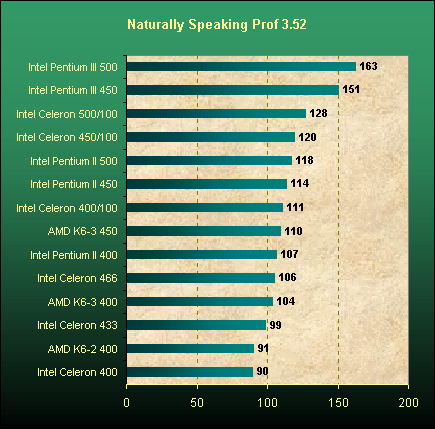New CPUs from AMD and Intel
Special Pentium III Software Performance - Dragon Naturally Speaking Professional 3.52
Dragon's Naturally Speaking is a well known professional voice recognition software and the latest version (3.52) is taking advantage of Pentium III's 'streaming SIMD extensions'. Today's PC computing power is increasing at a very fast pace and the prices are dropping at the same time. This opens a great future to voice recognition software, which always needed a lot of computation power. Voice recognition is certainly a very important step to make systems more user friendly and will significantly increase the acceptance of computers as soon as it becomes affordable. The benchmark is turning a voice recording into a text file and measures the time it takes to finish the document. This does of course not apply to real world, since we won't dictate faster with a faster system. However, scoring well in this benchmark is a good measure of how long it takes until the system is trained to your voice.
Pentium III scores a lot better than all the other CPUs, its performance is about 25% better than Pentium II at the same clock speed, seemingly all due to the new SSE-instructions. The results show a lot more interesting stuff as well though. Naturally Speaking is obviously heavily depending on the memory bandwidth, which is why a Celeron 400 at 66 MHz bus clock is a huge 20% slower than a Celeron 400 at 100 MHz bus clock, something you hardly ever seen in any other benchmark. It seems that L2-cache speed is also very important to Naturally Speaking, since Celeron is scoring a whole lot better than a Pentium II at the same clock/bus clock.
K6-3 is not looking great in this benchmark, but how could it? This benchmark comes directly from Intel and Naturally Speaking is of course not 3DNow!-optimized. I have to say though that Intel is doing an excellent marketing job by providing a benchmark for a voice recognition software that is PIII-optimized. I just heard that Via-Voice is supposed to be 3Dnow!-optimized, but would the marketing department of AMD let us know about it or even use it for the presentation of K6-3? Well, they obviously don't, and that's one of the many reasons why Intel is doing a lot better than AMD.
Get Tom's Hardware's best news and in-depth reviews, straight to your inbox.
Current page: Special Pentium III Software Performance - Dragon Naturally Speaking Professional 3.52
Prev Page High End Application Performance Under Windows NT Next Page Special Pentium III Software Performance - Microsoft Netshow Encoder